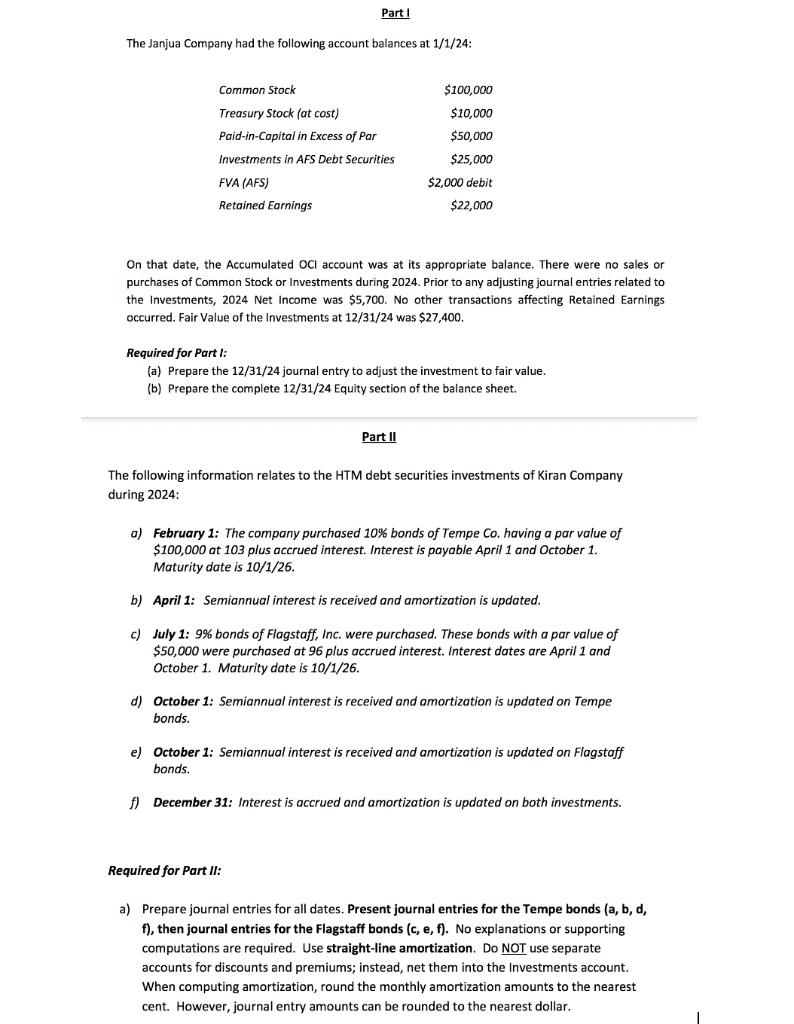Answered step by step
Verified Expert Solution
Question
1 Approved Answer
Part I The Janjua Company had the following account balances at 1/1/24: Common Stock Treasury Stock (at cost) Paid-in-Capital in Excess of Par Investments


Part I The Janjua Company had the following account balances at 1/1/24: Common Stock Treasury Stock (at cost) Paid-in-Capital in Excess of Par Investments in AFS Debt Securities FVA (AFS) Retained Earnings On that date, the Accumulated OCI account was at its appropriate balance. There were no sales or purchases of Common Stock or Investments during 2024. Prior to any adjusting journal entries related to the Investments, 2024 Net Income was $5,700. No other transactions affecting Retained Earnings occurred. Fair Value of the Investments at 12/31/24 was $27,400. $100,000 $10,000 $50,000 $25,000 $2,000 debit $22,000 Required for Part I: (a) Prepare the 12/31/24 journal entry to adjust the investment to fair value. (b) Prepare the complete 12/31/24 Equity section of the balance sheet. Part II The following information relates to the HTM debt securities investments of Kiran Company during 2024: a) February 1: The company purchased 10% bonds of Tempe Co. having a par value of $100,000 at 103 plus accrued interest. Interest is payable April 1 and October 1. Maturity date is 10/1/26. b) April 1: Semiannual interest is received and amortization is updated. c) July 1: 9% bonds of Flagstaff, Inc. were purchased. These bonds with a par value of $50,000 were purchased at 96 plus accrued interest. Interest dates are April 1 and October 1. Maturity date is 10/1/26. d) October 1: Semiannual interest is received and amortization is updated on Tempe bonds. Required for Part II: e) October 1: Semiannual interest is received and amortization is updated on Flagstaff bonds. f) December 31: Interest. accrued and amortization is updated on both investments. a) Prepare journal entries for all dates. Present journal entries for the Tempe bonds (a, b, d, f), then journal entries for the Flagstaff bonds (c, e, f). No explanations or supporting computations are required. Use straight-line amortization. Do NOT use separate accounts for discounts and premiums; instead, net them into the Investments account. When computing amortization, round the monthly amortization amounts to the nearest cent. However, journal entry amounts can be rounded to the nearest dollar. Part I The Janjua Company had the following account balances at 1/1/24: Common Stock Treasury Stock (at cost) Paid-in-Capital in Excess of Par Investments in AFS Debt Securities FVA (AFS) Retained Earnings On that date, the Accumulated OCI account was at its appropriate balance. There were no sales or purchases of Common Stock or Investments during 2024. Prior to any adjusting journal entries related to the Investments, 2024 Net Income was $5,700. No other transactions affecting Retained Earnings occurred. Fair Value of the Investments at 12/31/24 was $27,400. $100,000 $10,000 $50,000 $25,000 $2,000 debit $22,000 Required for Part I: (a) Prepare the 12/31/24 journal entry to adjust the investment to fair value. (b) Prepare the complete 12/31/24 Equity section of the balance sheet. Part II The following information relates to the HTM debt securities investments of Kiran Company during 2024: a) February 1: The company purchased 10% bonds of Tempe Co. having a par value of $100,000 at 103 plus accrued interest. Interest is payable April 1 and October 1. Maturity date is 10/1/26. b) April 1: Semiannual interest is received and amortization is updated. c) July 1: 9% bonds of Flagstaff, Inc. were purchased. These bonds with a par value of $50,000 were purchased at 96 plus accrued interest. Interest dates are April 1 and October 1. Maturity date is 10/1/26. d) October 1: Semiannual interest is received and amortization is updated on Tempe bonds. Required for Part II: e) October 1: Semiannual interest is received and amortization is updated on Flagstaff bonds. f) December 31: Interest. accrued and amortization is updated on both investments. a) Prepare journal entries for all dates. Present journal entries for the Tempe bonds (a, b, d, f), then journal entries for the Flagstaff bonds (c, e, f). No explanations or supporting computations are required. Use straight-line amortization. Do NOT use separate accounts for discounts and premiums; instead, net them into the Investments account. When computing amortization, round the monthly amortization amounts to the nearest cent. However, journal entry amounts can be rounded to the nearest dollar.
Step by Step Solution
★★★★★
3.55 Rating (152 Votes )
There are 3 Steps involved in it
Step: 1
Part I a Journal entry to adjust the in...
Get Instant Access to Expert-Tailored Solutions
See step-by-step solutions with expert insights and AI powered tools for academic success
Step: 2

Step: 3

Ace Your Homework with AI
Get the answers you need in no time with our AI-driven, step-by-step assistance
Get Started


